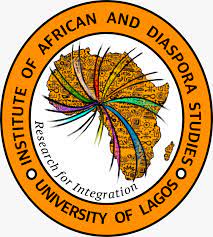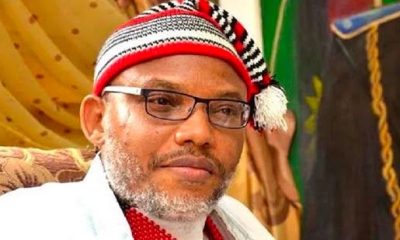NEWS
We now Disseminate Research Findings through Youtube — Institute

The Institute of African and Diaspora Studies (IADS) University of Lagos, says it has broken new grounds with its ability to disseminate research findings by adopting documentary making,
It says it has dymistified the traditional academic method of publishing such findings in journals.
The Director of the centre, Prof.
Muyiwa Falaiye, said these in an interview with the newsmen in Lagos, on Wednesday.He spoke on the sidelines of the fifth anniversary celebration of the centre.
According to him, as the foremost institute of African and Diaspora Studies in Africa, the centre has in the past five years, also recorded other giant strides.
He said it had done so in human capacity building, attracting commendation to the university and Nigeria at large.
“Today, we are celebrating our fifth anniversary as an institute.
“The IADS is five years and we decided that we should mark it, not in a very big way, but just to remind ourselves of the task ahead and to look back to see some of the things we have done and what we can do better in the next five years.
“This institute is the foremost in African Studies, in the continent today. we have been able to do research that have real cutting edge innovations for Africa and Nigeria, and as I speak, there are 30 ongoing research activities here in this institute.
“It may please you to also know that in the five years of existence as an institute, we have come up with innovations that are far from the way things used to be done, especially in the area of research, learning and advocacy.
“One of such ground-breaking innovation is the fact that we have created a new channel of disseminating research findings.
“We have now demystified that by making our research findings available on You tube, through documentary.
“This is nouveau and this is being copied by several other institutes globally, and we have also been able to find the right mix between research, teaching and advocacy.
“In five years, we merged the PhD programme, which is also unprecedented, and a few other things that we have done.
“We are one of the first institutes in the world to adopt documentary making as an avenue to disseminate research findings, which was not the case before,” he stated.
Falaiye noted that the development was contrary to most traditional academic methods, which was to publish research findings in journals that many people do not have access to.
The director stated that starting fellowship programmes, as well as attracting several research grants and creating an opportunity to bring in foreign scholars, had further put the centre on the right track.
He added that the institute had also brought in researchers, both old and young, to advance its course.
According to him, the pot pourri of activities and events going on in the last five years in the institute spanning areas of research, teaching and advocacy, have also seen it mentor young researchers across the country.
The director noted that the entire achievements had impacted the image of both the university, scholarship and the country at large.
“You will be surprised that several visiting scholars have now found home here.
“Those who otherwise, will not like to come to Nigerian universities, now struggle to get access to our institute here, as either visiting fellows, visiting researchers or visiting young scholars.
“This again is nouveau and unprecedented in the history of this country,” he stated.
He, however, said the institute had had its fair share of challenges, especially in the area of funding.
“Our mantra here is, no research without funding. Sometimes, we do not get the kind of funding we need.
“Sometimes too, the challenges confronting Nigeria affect us, we still have issues of power sometimes too, internet connectivity, and issues of the general image or perception of our country out there.
“Few scholars will not want to come this way because of the image of our country outside, thinking it is not a safe place to come to and more.
” All of these sometimes, affect our perception out there, but luckily, those of them who had managed to come here and have been with us for a while, had gone back with beautiful stories to tell.
“They have been able to carry encouraging message about what we do here,” he said.
Speaking further on funding, he said research funding should be left to those outside government, which cannot do everything.
He emphasised the need for institutions to look outside for funding of research, from the industries and from individuals who believed such research could change the perspectives or direction of the industries.
According to him, relying on government for funding of research will not serve anyone any good.
Also speaking, the Vice Chancellor of the university, Prof. Oluwatoyin Ogundipe expressed satisfaction about the achievements recorded so far by the institute, in its five years of existence.
He told reporters that attracting research grants both locally and internationally was a key achievement that had engendered the much needed focus of the centre.
“I want to say that I am highly impressed with what they have done so far within the last five years.
“Attracting research grants both at the local and international levels, as well as bringing in scholars from outside the country and even within, is to say the least, heartwarming and worth commending.
“The centre has always been able to sponsor research, PhD research works and you cannot believe it that even someone from outside the university once got research grant support for the PhD students.
“We have their postgraduate students that are ongoing. So, they have done excellently well but I know we can still do better. In the next five years.
“I want to see a centre that will bring in more scholars from outside the country to come and interact and learn about our culture.
“I want them to also interact and learn in the area of migration. It is not only about physical migration, we also have the social migration, as well as economic migration, that will lead to development,” Ogundipe stated.
Prof. Rahmon Bello, immediate past vice chancellor of the university, on his part, said that the centre project came up during his tenure in the institution.
“I am happy with what I have seen within its five years of existence. We came up with the theme of the concept at the time, with the University of West Indies, after a lecture here in Lagos.
“It came up with this idea and I am happy today that this centre has transformed to reality and it is doing very well.
” What it has been doing in the past years, I want to give kudos to the director and members of the centre and to the current management of the university of Lagos, for keeping the idea afloat and to ensure that they support the centre to make it viral.
” The centre is making waves and I believe in the next five years, it will reach the top of its pinnacle in Africa, and I want to say congratulations to the centre,” Bello said.(NAN)
NEWS
Rotary Club of Umuahia Funds Life-Changing Surgery for Nigerian Girl with Rare Condition

From Chidi Precious, Umuahia
In a powerful demonstration of compassion and community service, the Rotary Club of Umuahia has supported the transformation of the life of a young girl born with a rare congenital condition—polydactyly—by funding her corrective surgery.
The presentation of a cheque of N500,000 took place at Madonna Catholic Hospital, Umuahia, where the surgery will be performed.
The beneficiary, Little Miss Daberechi, was born with extra fingers and toes, a medical anomaly that posed both functional and social challenges. Her father, Wisdom, desperate for help, reached out to the Rotary Club of Umuahia for support.
“We were deeply moved by his plea,” said Rotarian Temitope Nnaomah, President of the Rotary Club of Umuahia, during a public address on the initiative.
“Coming together, our club contributed N500,000 to Madonna Catholic Hospital, Umuahia, specifically to support Daberechi’s surgery.”The donation will not only enable a successful medical procedure but also bring immense relief to the family, lifting a heavy financial burden and restoring hope to their lives.
According to her, the initiative falls under Rotary International’s area of focus on Disease Prevention and Treatment, underlining the club’s commitment to improving health and providing access to essential medical care.
“Access to surgery for congenital conditions like polydactyly remains out of reach for many families in low-income communities. Through this act of service, the Rotary Club of Umuahia has helped prevent prolonged suffering and long-term complications for Daberechi, showcasing how targeted interventions can lead to life-changing results.
Also speaking, a Past District Governor of Rotary International District 9142, Rotarian Grace Okaro, who is also a member of the Rotary Club of Umuahia stated, “Through swift community mobilization, internal fundraising, and prioritization of Rotary’s health-related mission, our club was able to act promptly and decisively”. This project exemplifies Rotary’s guiding principle: “Service Above Self.”
Past Presidents of the Club, Rotarians Sylvester Ibeleme and Chinedu Brown, the Club Secretary, Rotarian Ijeoma Irokanulo and other members of the Club were present at the cheque handover ceremony.
NEWS
Abia Tricycle Operators Get Free Fuel in Praise of Governor’s Road Reforms

From Chidi Precious, Umuahia
In a bid to celebrate ongoing road infrastructure improvements under Governor Alex Otti, the Abia State Tricycles Operators Union (ASTOPU) have rolled out a fuel palliative for its members across key areas of Aba, the commercial hub of the state.The event reinforces Otti’s image as a reform-driven leader, with transport operators positioning themselves as active stakeholders in his development agenda.
The initiative, flagged off by the Abia State Commissioner for Transport, Dr. Chimezie Ukaegbu, recognizes the role of commercial transport operators in driving economic development. The event witnessed the free distribution of Premium Motor Spirit (PMS) to tricycle riders at designated filling stations including Tonimas (Aba-Owerri Road), New Filling Station (Enugu-Port Harcourt Expressway), and Conoil (Asa Road), among others.At the launch, Dr. Ukaegbu described transportation as the backbone of development, emphasizing that operators are “partners in progress.” He called for greater tax compliance among riders and assured them that the government would safeguard their interests.“No one will exploit you. Your issues will be listened to and addressed,” Ukaegbu said, urging continuous adherence to traffic regulations.Also addressing the gathering, Dr. Obioma Nwaogbe, Senior Special Assistant to the Governor on Transportation, highlighted the strategic role of transport in development. “Supporting ASTOPU is a step towards sustaining a structured and inclusive transport sector,” he said.ASTOPU Chairman, Victor Azubuike, said the fuel gesture was a celebration of the Governor’s achievements, particularly in road rehabilitation, which has improved tricycle operations in the city.“Before now, our tricycles were constantly in need of repairs due to bad roads. But today, we enjoy smoother rides. Our business has become more efficient,” Azubuike stated.The union also acknowledged improvements in drainage and water control, which they say have reduced flooding and damage to roads.Beneficiaries of the initiative, including Kingsley Nwachukwu and Akachi Orji, expressed gratitude for the support. “This is a huge relief at a time fuel costs have become unbearable,” said Nwachukwu.Foreign News
Philippine President Calls for Resignation of All Cabinet Secretaries

Philippine President Ferdinand Marcos Jr. has asked all of his Cabinet secretaries to submit their resignations on Thursday in what he called a “bold reset” of his administration following last week’s mid-term elections.
The elections saw more opposition candidates win crucial Senate seats, signaling shifting political tides.
Marcos, the 67-year-old son of the late Philippine dictator overthrown in 1986, won the presidency in a landslide in 2022, a stunning political comeback marked by a call for national unity.
However, his vice-presidential running mate, Sara Duterte, also widely popular, later distanced herself from Marcos in a falling-out that had sparked intense political discord.
Marcos had since emerged as one of the region’s most vocal critics of China’s aggression in the disputed South China Sea, bolstered by support from the United States and other allies. Domestically, he continued to face significant challenges, including high inflation, unfulfilled promises to lower rice prices, and growing concerns over kidnappings and other crimes.
“This is not business as usual,” Marcos said in a government statement.
“The people have spoken and they expect results, not politics, not excuses. We hear them and we will act.” (AP/NAN)






























